Graham Reid | | 4 min read
Bruce Springsteen: Ain't Good Enough For You
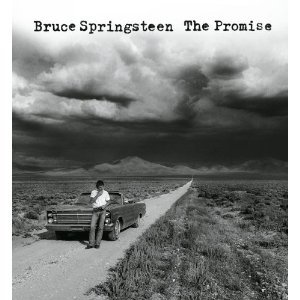
“You know kids
go, 'Hey, when are you gonna make a record?',” Bruce Springsteen
said in March 77, “I say, 'One of these days'.”
And they were
difficult days for the man they call The Boss.
After his breakthrough album Born to
Run in '75 – which sold around 10 million globally and took him
to the covers of Newsweek and Time in the same week in
October – there was a gap of three years before Springsteen's next
album Darkness on the Edge of Town.
These days that isn't such a long
hiatus but, as he notes in the hour-long doco included in the
3CD/3DVD box set version of this double CD, he'd recorded two albums
in the first year he'd had a contract and Born to Run shortly
after. In the early Seventies you were expected to keep the music
coming.
“Two or three years between records
then and you'd disappeared,” he says. “I read all these articles
saying 'Whatever happened to . . .?', 'You're dead, flash in the
pan'. And for all I knew that might have been true.”
The reason for the hold-up was a
lawsuit with manager Mike Appel which meant he couldn't go into a
studio with a producer Appel didn't approved of.
Ironically the delay gave Springsteen
the freedom of time to figure out where he wanted to go as a writer.
And it wasn't the full-throated adrenalin rush of “strap your hands
across my engines”.
Darkness was a much more gloomy
and adult album, not so much characters born to run but working
people driving round in circles through the boredom of factory work,
bad marriages and the grind of dead-end suburbia.
“I wanted to write about life in the
confines of the small towns I grew up in,” he says. “I was 27 and
the product of Top 40 radio. And songs like the Animals' It's My
Life and We Gotta Get Out Of This Place were infused with
an early pop class-consciousness and that -- along with my own
experience, the stress and tensions of my father's life, my mother's
life trying to make ends meet – came to influence my writing.
“I had a reaction to my own good
fortune and I asked myself new questions. I felt a sense of
accountability to the people I'd grown up alongside. I began to
wonder how how to address that feeling. All of this lead to the turn
my writing took on Darkness.”
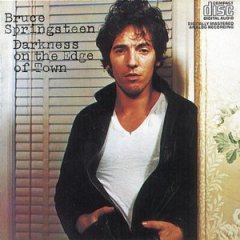 It was an album that didn't produce a
hit single but confirmed Springsteen as writer of power and insight,
a man who looked at the limitations and compromises of life, and also
of people's resilience and commitment, and of keeping faith. It
dignified the struggles of working people.
It was an album that didn't produce a
hit single but confirmed Springsteen as writer of power and insight,
a man who looked at the limitations and compromises of life, and also
of people's resilience and commitment, and of keeping faith. It
dignified the struggles of working people.
During that long wait after Born to
Run, Springsteen wrote constantly, the band toured to keep an
income flowing, and they rehearsed his new songs which started to
number around 70. Many of them were working drawings, some went to
other artists like his old running mate from New Jersey, Southside
Johnny (the glorious soul ballad Hearts of Stone), The Knack
(Don't Look Back), the Greg Kihn Band (Rendezvous) and
the Pointer Sisters (Fire). Patti Smith famously finished off
Because the Night which gave her a hit, “my only one” she
laughs here.
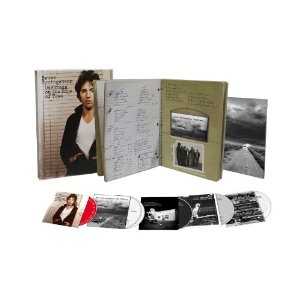 Aside from the remastered/remixed
Darkness album on that expanded edition of The Promise: The
Darkness on the Edge of Town Story, there is the separate double disc
The Promise, 22 of those discarded songs, among them his
versions of Rendezvous (which previously appeared on his 98
Tracks box set of outtakes), Fire and Because the
Night.
Aside from the remastered/remixed
Darkness album on that expanded edition of The Promise: The
Darkness on the Edge of Town Story, there is the separate double disc
The Promise, 22 of those discarded songs, among them his
versions of Rendezvous (which previously appeared on his 98
Tracks box set of outtakes), Fire and Because the
Night.
On
The Promise is a driving version of Racing in the Streets
(more like the wall of sound on Born to Run than
the spare Darkness treatment),
Gotta Get That Feeling which is a Spanish Harlem/Ben E
King-styled slice of dramatic pop; Come On which was rewritten
to become the melancholy Factory on
Darkness; Candy's Boy (a different version of what became
Candy's Room), the glorious ballad One Way Street which
Southside Johnny or Willy De Ville could have picked up and
Brokenhearted (an Orbison-styled ballad), the latter , the
hand-clap rocker Ain't Good Enough For You which must have
gone down well in bars along the Jersey Shore; Talk to Me
(which Southside Johnny did cover) and then a final set of Breakaway,
The Promise, City of Night and The Way in which that
darkness comes down . . .
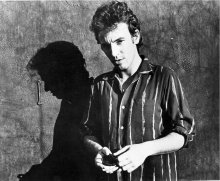 More than just an insight into the
creative process, The Promise shows how Springsteen drew on
that deep well of Top 40 jukebox music and Brill Building pop but
also how that was transformed by maturity, an increasing literary
sensibility and an awareness of that hollowness in people's lives
where music was the passport to three minutes of freedom from the
grind and darkness of life.
More than just an insight into the
creative process, The Promise shows how Springsteen drew on
that deep well of Top 40 jukebox music and Brill Building pop but
also how that was transformed by maturity, an increasing literary
sensibility and an awareness of that hollowness in people's lives
where music was the passport to three minutes of freedom from the
grind and darkness of life.
“Part of that pop and rock promised
was the never-ending Now, it's about living now, that need to be
alive right now,” he says in the doco.
“Those three minutes it was all on,
you were lifted up into a higher place of living and experiencing and
there was the this beautiful ever present Now.”
Darkness didn't necessary lift
anyone up, but it allowed them to think someone understood their life
outside of that Now . . . an uplifting Now which is all over The Promise, a
great lost Springsteen album from the mid Seventies.

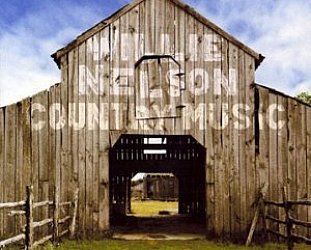
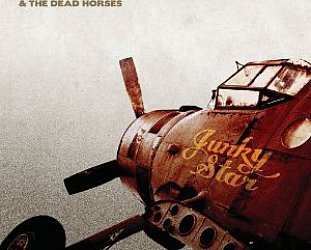
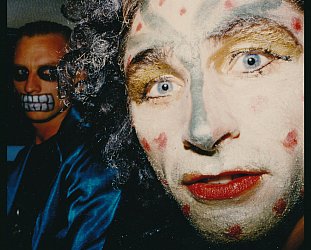
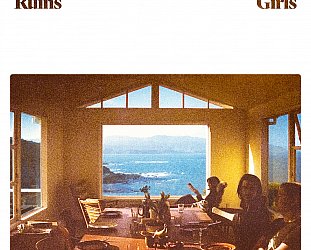
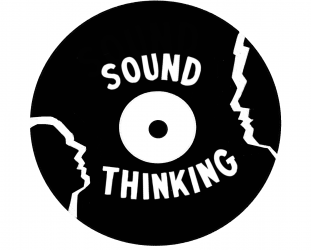

Angelique Jurd - Nov 30, 2010
Hey Graham - great review. My partner and I were among the dozen die hard fans who went to see this in the Botany cinema - most of the rest present that night were friends - and our boxed set has just arrived.
SaveWe loved it and I'm really looking forward to getting home and going through the notebooks....
Darkness has such fabulous imagery - and hearing some of the alternatives was great.
I would however love to know what kept the band from seriously injuring the guy - especially Max Weinberg - he must be murder to work with.
Cheers
Angel
Blair - Dec 11, 2010
You forget how incredibly prolific he was during this time - after The River a couple of years later (a double album and lots of alternate tracks from there ended up on "Tracks") he wrote & produced an album from Gary US Bonds with the E Street Band - there is a duet called Jole Blon that is worth checking out on iTunes. Listening to The Promise CD from the box set you can hear the influences showing through - eg Buddy Holly and Willy de Ville (yes Willy de Ville - there are at least 4 x tracks that could have been written & performed by Mink de Ville).The box set is outstanding - the live DVD from a show in '78 especially is worth the price of admission. I don't know hoe they can top this with an anniversary "The River". BTW Wellington missed out on the cinema showing (grumble, grumble).
Saverobw - Jan 13, 2011
just picked up Springsteen's 'The Promise' box set companion book, amazing original photos and stories frm the Darkness tour. Limited Edition http://www.thelightinDarkness.com
Savepost a comment